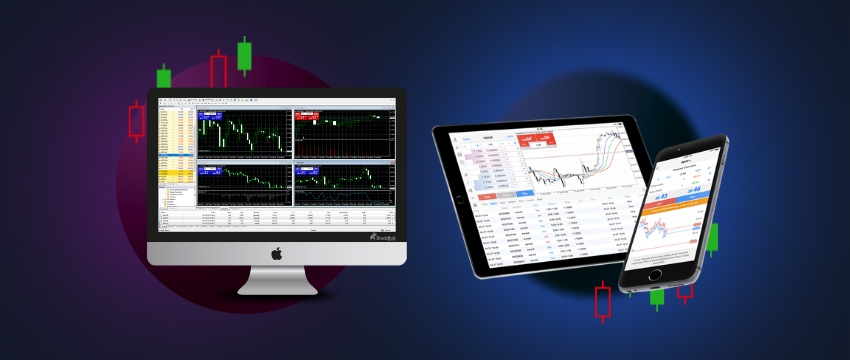In the past, only employees of big financial institutions, brokerages, and trading houses were allowed to engage in active stock market trading. With the development of online trading and the fast spread of news, competition has increased.
Retail investors now find it easier than ever to invest thanks to user-friendly investment apps and the 0% commission offered by various companies.
Day investing is a quick-paced type of buying and selling where people purchase and sell securities all in one day. The goal is to make money through brief changes in the prices of stocks, options, futures, currencies, and other assets.
Typical strategies and analysis types used by day traders include the following:
Technical analysis: A strategy used to predict future trends by examining historical prices and trading patterns.
Momentum trading: A strategy focused on capitalising on brief trends and reversals.
Traders diários, as opposed to long-term investors, are more interested in making quick money out of market swings than they are in the securities’ underlying value. If you do it right, day trading can potentially be very profitable.
However, it’s usually difficult for beginners and frequently a losing strategy for inexperienced traders. Read on for some useful tips to help you master day trading.

Day trading: How it works
Buying and selling securities quickly within a single trading day is known as day trading, and it is a high-stakes strategy in the mercados financeiros.
This style of trading works by taking advantage of slight changes in the price of highly liquid stocks or other financial instruments.
Traders try to take advantage of short-term price swings and market inefficiencies by opening and closing positions in a matter of hours, minutes, or even seconds.
Since day traders rarely hold overnight positions and close out all trades before the market closes, this is very different from conventional “buy and hold” investment strategies.
High-speed internet connections, advanced charting platforms, and real-time market data feeds are all part of the standard day trader’s toolkit.
Using technical analysis, market sentiment, and breaking news, these tools help traders determine possible entry and exit points. To get a competitive edge, many day traders focus on particular industries or investing techniques, like scalping or momentum trading.
An important aspect of day trading is risk management. In order to minimise possible losses, successful traders frequently use stop-loss orders and strict rules regarding position sizing.
To avoid wiping out their account with a series of losses, traders usually set a maximum amount they are willing to lose per transaction, typically limiting it to 1% to 2% of their investment capital.
In reality, successful day investing requires a great deal of concentration. Moreover, it demands quick decision-making. Finally, it also necessitates the ability to stay calm under pressure.
Investors must interpret complex market signals, execute transactions with precise timing, and continuously monitor various sources of data.
In contrast to long-term investing strategies, which are passive, this high-stress activity combines aspects of analysis, psicologia, and quick-thinking action.
Why is it hard to day trade?
Day trading requires a lot of practice and knowledge, and several factors can make it difficult.
First and foremost, understand that you will be competing against professionals whose careers revolve around trading. These people leverage the industry’s best technology and connections, positioning themselves for success.
Next, the marginal rate applies to short-term gains from investments held for one year or less. The advantage is that your losses will offset any gains.
Furthermore, as a new day trader, you may be susceptible to emotional and psychological biases that influence your trading like when your capital is at stake and you’re losing money on a trade for example.
Experienced, skilled professional traders with substantial funds can typically overcome these obstacles.

There are a number of reasons why day trading is difficult:
- Be prepared: Day traders typically incur heavy losses in their first few months of trading, and many never achieve profitability. So, expect to face significant financial losses.
- Stress: Day trading is an extremely stressful full-time job. Observing dozens of ticker quotes and price fluctuations to detect fleeting market trends requires intense concentration.
- Alavancagem: Day traders rely heavily on borrowing money. Day-trading strategies profit by using borrowed money as leverage. Many traders not only lose all of their own money, but also go into debt.
- Multiple catalysts: The reality is that financial assets are influenced by a variety of factors that most people find difficult to understand. For example, even if a company reports strong results, its stock price may fall. This can happen if it issues weak forward guidance.
- Multiple concepts: The next reason trading is difficult is that there are numerous concepts that must be learned before beginning to trade. For example, one must understand the concepts of a análise técnica como a análise fundamental.
- Volatilidade: At times, the financial markets can be extremely volatile, making it difficult to operate.
- Impatience: When traders first start out, they can become impatient. They want to start now and succeed tomorrow. Patience is one of the keys to success as a trader.
10-day trading tips for beginners
Knowledge is crucial
Stay up to date on stock market trends, notícias económicas, e stock-related events. Research your preferred stocks, understand market trends, and bookmark trustworthy news sources.
Set a budget
Decide how much you are willing to risk per transaction. Successful investors typically risk no more than 1-2% of their account on each investment. Invest only with funds you can afford to lose.
Commit time
Day trading requires concentration and dedication. Be prepared to monitor markets throughout the day, as opportunities may arise at any time.
Start small
Begin by trading just one or two stocks to make tracking easier. Consider fractional shares if you want to invest smaller amounts.
Avoid penny stocks
Penny stocks frequently lack liquidity and pose significant risks. Instead, focus on stocks that have been thoroughly researched and are of higher quality.
Time your trades
The most volatile times for the market are when it opens and closes. Beginners should observe trends during these periods before diving in.
Use limit orders
Limit orders help to control trade prices and reduce losses during market reversals. They provide precision, but do not guarantee execution.
Set realistic goals
You do not have to win every trade to profit. Aim for a consistent strategy that includes defined risk and clear entry/exit points.
Reflect & adapt
Regularly review your trades to identify flaws and improve strategies. Discipline and emotional control are crucial.
Follow your plan
Create a solid strategy and stick to it. Avoid making rash decisions, and always remember to plan your trade before trading.

Considerações finais
Day trading is difficult to master. It requires patience, skill, and discipline.
Many people who try it lose money, but the tips and techniques described above can help you develop a potentially profitable strategy.
Day traders, both institutional and individual, contribute significantly to the market’s efficiency and liquidity.
With enough experience, skill development, and consistent performance evaluation, you may be able to outperform the odds and increase your chances of successful trading.
Why is it difficult to make money consistently with day trading? To do so, many skills and attributes must be combined, including knowledge, experience, discipline, mental fortitude, and trading knowledge.
Beginners may struggle to implement basic strategies such as cutting losses or letting profits run.
Furthermore, maintaining trading discipline in the face of challenges like market volatility or large losses is difficult.
Finally, day trading sets you against millions of other market participants, including trading professionals with cutting-edge technology, extensive experience and expertise, and deep pockets. That is not an easy task when everyone is trying to take advantage of market inefficiencies.
Isenção de responsabilidade: Este material destina-se apenas a fins informativos e educativos e não deve ser considerado como conselho ou recomendação de investimento. A T4Trade não se responsabiliza por quaisquer dados fornecidos por terceiros referenciados ou hiperligados nesta comunicação.




